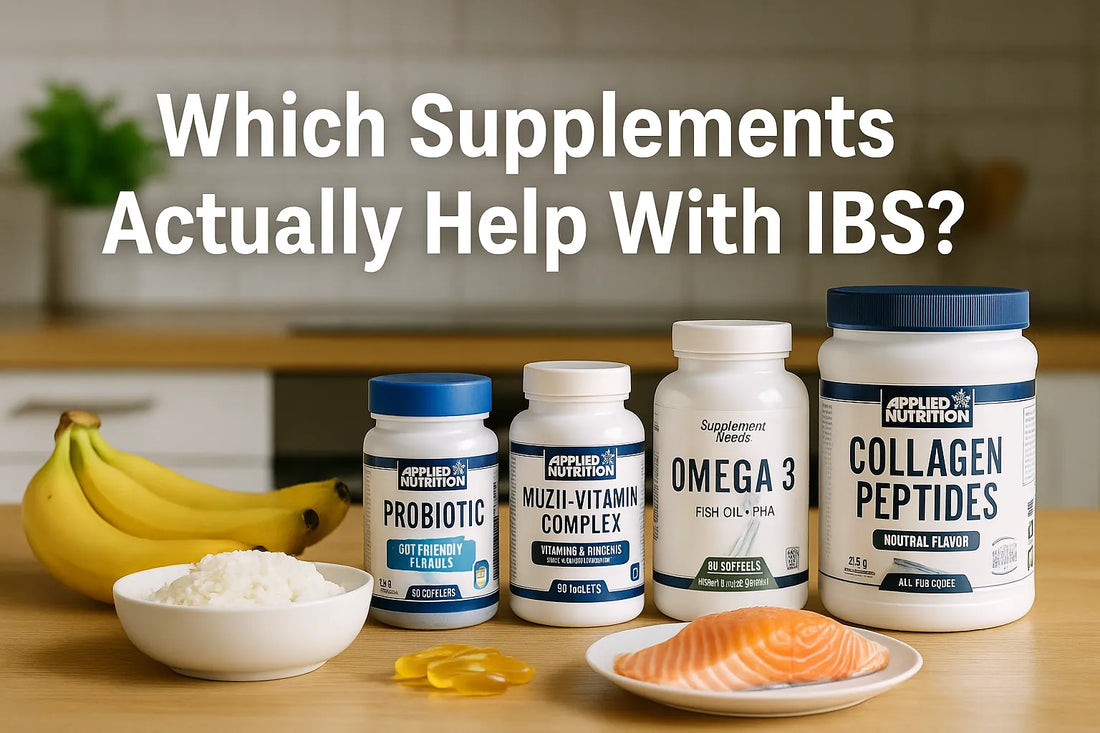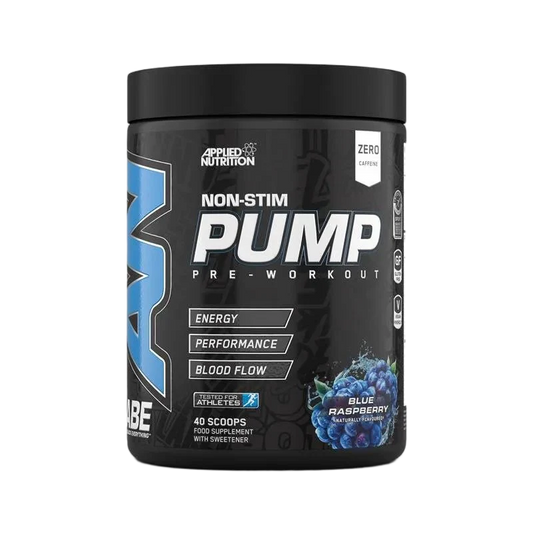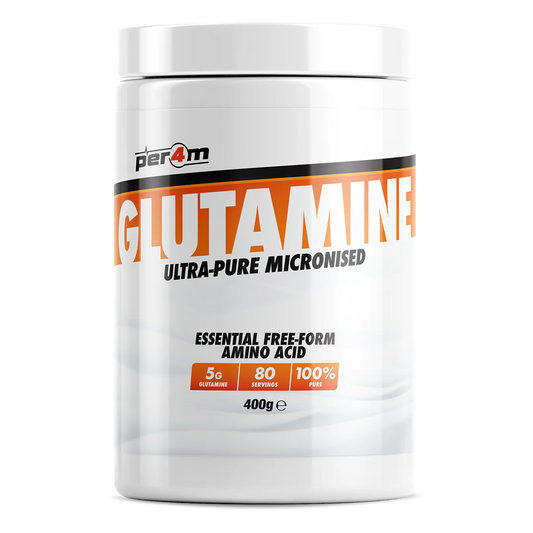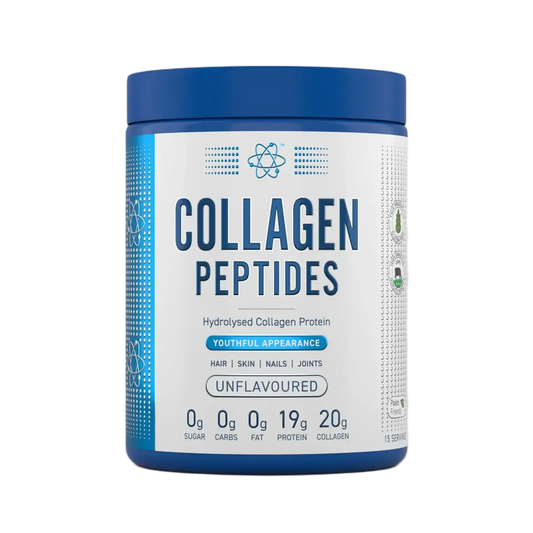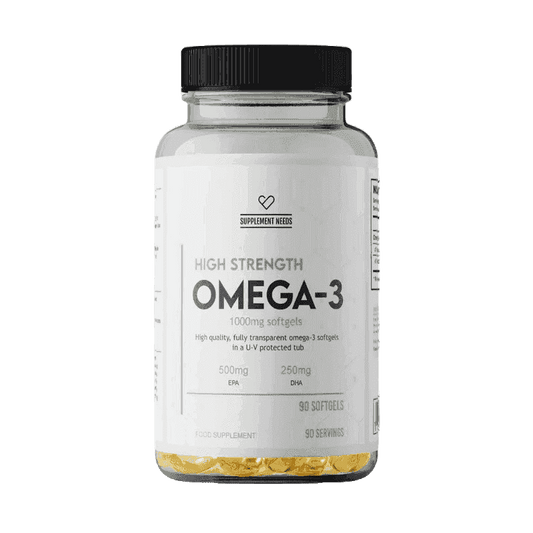Introduction: Living With IBS in Daily Life
If you’ve ever dealt with the unpredictable flare-ups of irritable bowel syndrome (IBS), you’ll know it’s more than “just an upset stomach.” IBS can affect workdays, workouts, social plans, and even sleep. Bloating, cramps, diarrhoea, constipation, fatigue — symptoms can shift from one day to the next, leaving people feeling frustrated and powerless.
One of the hardest truths? IBS has no single cure. It’s a condition shaped by diet, stress, gut-brain interactions, and lifestyle choices. That said, the right supplements can make a huge difference. They can’t “fix” IBS overnight, but they can support digestion, calm flare-ups, reduce inflammation, and replace nutrients that IBS tends to deplete.
This is especially important in the UK, where IBS affects around 1 in 7 people. Many sufferers already cut out gluten, dairy, and high-FODMAP foods, which can help — but restrictive diets often create nutritional gaps. This is where targeted supplements step in.
In this two-part guide, we’ll explore exactly which supplements actually help with IBS, which ones to avoid, and how to build an IBS-friendly stack that supports long-term gut health.
1) Which Supplements Are Good for IBS?
When it comes to IBS, supplements should be chosen for calm and support, not intensity. Forget stim-heavy products or trendy quick-fixes — you need nutrients that genuinely work with the body to ease digestion.
The five supplement categories that stand out are:
-
Probiotics → These restore balance to the gut microbiome, supporting healthy bacteria that influence digestion, bloating, and even mood.
-
Magnesium → Calms the muscles of the digestive tract, reducing cramping and constipation.
-
Omega-3 fatty acids → Fight inflammation in the gut lining, helping to reduce pain and discomfort.
-
Digestive enzymes → Help break down food more efficiently, reducing bloating and malabsorption.
-
Multivitamins → Fill in nutritional gaps caused by restrictive diets or absorption issues.
💡 A strong starting point for IBS sufferers is Feel Supreme Probiotics. By encouraging a healthier balance of gut flora, probiotics can reduce bloating, regulate bowel movements, and improve tolerance to certain foods.

2) What Supplements Should You Not Take With IBS?
Not all supplements are gut-friendly. In fact, some can worsen IBS symptoms:
-
High-stimulant pre-workouts → Caffeine, yohimbine, and other stims can overstimulate the gut, leading to urgency and cramps.
-
Fat burners → These often contain laxative-like compounds or thermogenic ingredients that irritate digestion.
-
Poor-quality fibre powders → While fibre is essential, some fibre supplements (like cheap inulin or wheat bran) can worsen gas and bloating.
-
Excess iron → Can trigger constipation, especially in IBS-C sufferers.
That doesn’t mean IBS sufferers can’t use supplements for fitness or energy. It just means avoiding formulas that irritate the gut and instead choosing gentle, IBS-friendly blends.
💡 For example, instead of using stim-heavy pre-workouts, many IBS sufferers prefer Applied Nutrition ABE Pump (Non-Stim) — it gives performance benefits without gut-disrupting caffeine.
3) What Vitamins Does IBS Deplete?
One of the lesser-known aspects of IBS is malabsorption. Because IBS disrupts digestion and transit time, it often leaves sufferers short on key vitamins and minerals.
The most common deficiencies include:
-
B Vitamins (especially B12 and B6) → Needed for energy, mood regulation, and nerve health. IBS-related diarrhoea or gut inflammation often reduces absorption.
-
Vitamin D → Linked to immune balance and gut barrier health. IBS sufferers are often deficient, particularly in the UK.
-
Magnesium → Flushed out by diarrhoea and underconsumed in restrictive diets.
-
Zinc → Important for tissue repair and immunity; often low in people with IBS.
Low levels of these vitamins worsen fatigue, brain fog, and recovery from flare-ups. That’s why a well-rounded multivitamin is invaluable.
💡 Applied Nutrition Multi-Vitamin Complex is a reliable choice, covering gaps in B vitamins, vitamin D, magnesium, and zinc — all critical for IBS sufferers.

4) What Is the Best Natural Thing for IBS?
IBS isn’t just about avoiding triggers — it’s about building resilience in the gut. Natural supplements can help manage symptoms without harsh side effects.
The standouts are:
-
Peppermint oil → Has been shown in studies to relax the muscles of the digestive tract, reducing cramping.
-
Probiotics → Support long-term gut flora balance.
-
Omega-3 fatty acids → Reduce inflammation that can worsen pain and sensitivity.
-
Magnesium → Aids in muscle relaxation and can ease constipation.
💡 A favourite here is Supplement Needs Omega 3. It delivers essential fatty acids that reduce gut inflammation, support brain function, and promote heart health — all areas where IBS sufferers often need extra help.

5) What Can You Take to Calm Down IBS?
When IBS flares hit — cramps, bloating, unpredictable bathroom trips — the goal is immediate relief. Supplements that calm the digestive tract and reduce irritation can make a massive difference.
Good options include:
-
Magnesium → Relaxes the digestive system.
-
Probiotics → Reduce bloating and improve stool consistency.
-
Collagen peptides → Help strengthen the gut lining, which can be weakened in IBS sufferers.
💡 Applied Nutrition Collagen Peptides are particularly interesting here. Beyond their well-known role in skin and joint health, collagen peptides also support the gut barrier, which can reduce sensitivity and flare-ups.
✅ What We’ve Looked Into So Far
-
IBS is common, frustrating, and can’t be “cured” — but supplements can ease symptoms and fill nutritional gaps.
-
The best IBS-friendly supplements include probiotics, magnesium, omega-3s, digestive enzymes, and multivitamins.
-
Certain supplements should be avoided (stim-heavy pre-workouts, cheap fibres, high-dose iron).
-
IBS sufferers often run low on vitamins like B12, D, magnesium, and zinc — so a multivitamin is essential.
-
Natural helpers like peppermint oil, probiotics, and omega-3s reduce gut inflammation and flare-ups.
-
Collagen peptides can calm IBS by supporting the gut lining.
So far, we’ve spotlighted five key products:
- Feel Supreme Probiotics
-
Applied Nutrition ABE Pump (Non-Stim) (as an alternative to gut-irritating pre-workouts)
- Applied Nutrition Multi-Vitamin Complex
- Supplement Needs Omega 3
- Applied Nutrition Collagen Peptides
🔜 Part 2 will cover:
-
What really causes IBS.
-
The biggest dietary triggers to avoid.
-
How supplements like glutamine and collagen help heal the gut.
-
Why probiotics and omega-3s are long-term allies.
-
A practical FAQ for IBS sufferers.
Which Supplements Actually Help With IBS? (Part 2)
6) What Is the Root Cause of IBS?
The frustrating thing about IBS is that it isn’t caused by one single factor. It’s a functional disorder, meaning the gut looks normal under a microscope, but the way it works is disrupted.
Research points to several overlapping causes:
-
Gut-brain axis imbalance → Stress and anxiety can trigger gut spasms.
-
Altered gut bacteria → Dysbiosis is common in IBS, where “bad” bacteria overgrow.
-
Inflammation and immune response → Even low-grade inflammation can contribute to sensitivity.
-
Food triggers → High-FODMAP foods ferment in the gut, producing gas and bloating.
This explains why IBS management is rarely “one-size-fits-all.” Some people benefit more from probiotics, others from magnesium, others from omega-3 or collagen. The key is building a supplement stack that supports multiple pathways: calming the gut, balancing bacteria, reducing inflammation, and filling nutritional gaps.
7) What Is the Biggest Trigger for IBS?
IBS triggers vary by person, but some are notorious culprits:
-
High FODMAP foods → Onions, garlic, beans, lentils, apples, and artificial sweeteners.
-
Caffeine → Stimulates the gut, often causing urgency.
-
Alcohol → Irritates the lining of the digestive tract.
-
Fatty or fried foods → Slow digestion, increase bloating.
The tricky part? Eliminating too many foods can leave you nutrient-deficient. That’s why supplements are so important — they bridge the gap between restricted diets and daily requirements.
💡 A multivitamin like Applied Nutrition Multi-Vitamin Complex helps cover essential vitamins (B12, D, magnesium, zinc) that might otherwise be missed when cutting trigger foods.

8) How Do I Heal My Gut From IBS?
You can’t “cure” IBS, but you can make the gut more resilient. Healing involves reducing irritation, restoring balance, and improving nutrient absorption.
Supplements that help:
-
Probiotics → Rebalance gut bacteria.
-
Collagen peptides → Support the gut lining.
-
Glutamine → Fuels intestinal cells and helps repair the gut barrier.
💡 Per4m Glutamine is especially powerful here. Known for muscle recovery, glutamine also serves as a primary fuel source for gut cells. It strengthens the intestinal wall, reducing “leakiness” and calming sensitivity.
9) How to Treat IBS Permanently?
At the moment, IBS can’t be permanently cured. But for many people, the right combination of diet, lifestyle, and supplementation makes symptoms so minimal it feels like remission.
The best long-term approach:
-
Daily probiotic → For microbiome stability.
-
Omega-3 → For anti-inflammatory protection.
-
Magnesium → For reduced cramping and improved regularity.
-
Collagen + glutamine → For gut wall support.
-
Multivitamin → To prevent deficiencies from dietary restrictions.
When taken consistently, these supplements make IBS more manageable and predictable.

10) What Are the Worst Foods for IBS?
It wouldn’t be a complete IBS guide without a quick look at foods that can sabotage your efforts. The biggest offenders include:
-
Onions and garlic → Packed with fermentable carbs.
-
Legumes (beans, lentils, chickpeas) → Gas-forming.
-
Wheat and rye → High in FODMAPs, often trigger bloating.
-
Dairy → Lactose can be problematic for many IBS sufferers.
-
Artificial sweeteners → Sorbitol, mannitol, and xylitol can cause diarrhoea.
Cutting these foods can bring relief — but it can also limit nutrients. That’s why IBS-friendly supplements matter: they ensure you’re not left depleted.
🧠 FAQ: Supplements for IBS
1. Do supplements help with IBS symptoms?
Yes. Probiotics, magnesium, omega-3, collagen, and glutamine can ease bloating, cramping, and gut inflammation.
2. What vitamins are good for IBS fatigue?
B12, magnesium, and vitamin D. They support energy and nerve health.
3. Can omega-3 help with IBS inflammation?
Yes — omega-3 fatty acids lower gut inflammation and support immune balance.
4. Should I take probiotics if I have IBS?
Yes, but start slowly. They can improve gut flora and reduce symptoms, though individual responses vary.
5. What is the best supplement for gut healing?
Glutamine and collagen peptides — they strengthen and repair the gut lining.
Conclusion: Building the IBS-Friendly Supplement Stack
IBS is a complex condition, but supplements offer powerful tools to ease the worst of it. By calming the gut, restoring balance, reducing inflammation, and filling nutrient gaps, the right products make day-to-day life far more manageable.
The IBS supplement stack:
-
Feel Supreme Probiotics → gut flora balance.
-
Applied Nutrition Multi-Vitamin Complex → fill nutrient gaps.
-
Supplement Needs Omega 3 → anti-inflammatory support.
-
Applied Nutrition Collagen Peptides → strengthen gut lining.
-
Per4m Glutamine → repair and protect gut wall.
Together, these supplements can reduce flare-ups, improve digestion, and bring back a sense of control.

